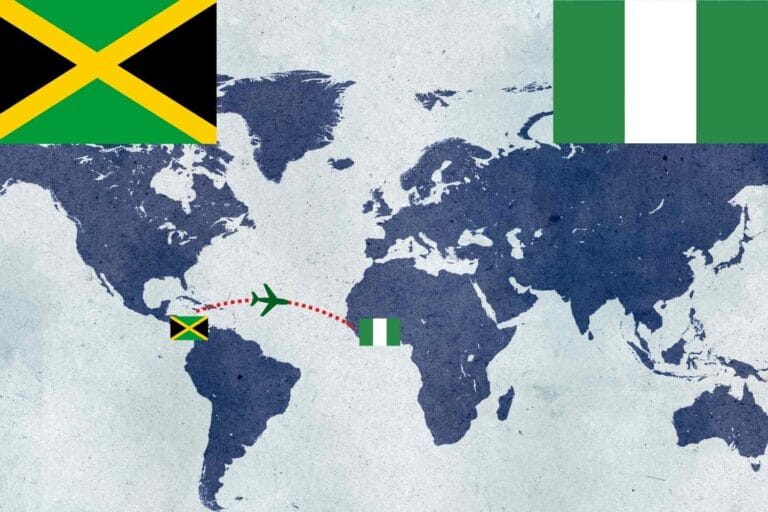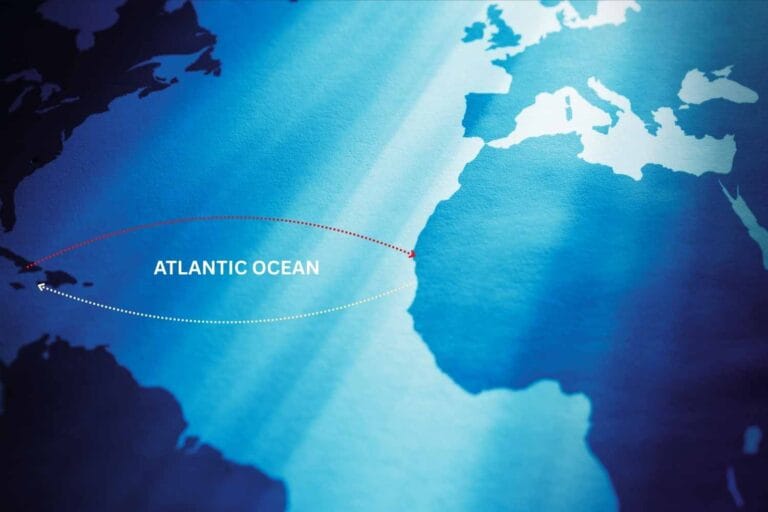If we track back in history, we’ll realize how far we have come as a people. I watched the movie Harriet the other day, and it brought tears to my soul. History is painful, to say the least. Yet, one theme remains—as African people, we have always fought for our rights, and slowly but surely, we are winning. Marcus Garvey tried to bring us home with the Black Star Line, but his efforts were thwarted by the powers that be. Yet today, we are hearing about the possibility of a direct flight from Kingston to Lagos becoming a reality.
I remember standing at Elmina Castle, gazing at the straight line across the Atlantic Ocean that carried our ancestors to the West. But imagine taking that same straight path back home. Imagine boarding a plane in Kingston, Jamaica, and landing in Lagos, Nigeria, hours later—without layovers.
A direct flight from Kingston to Lagos would be more than just a journey across the Atlantic. It would represent a permanent bridge between the Caribbean and West Africa, uniting people with shared histories. While no direct flights currently exist, the possibility raises intriguing questions about what such a route would look like.
In this blog, let us explore what this historic trip across the Atlantic Ocean would entail. I’m sure when this happens, our ancestors will sing songs of triumph from their graves. So, come with me!
The Flight Path from Kingston to Lagos

A direct flight from Kingston to Lagos would follow a simple path across the Atlantic Ocean, covering approximately 8,500 kilometers (5,280 miles). Currently, the world’s longest non-stop commercial flight, covers approximately 15,343 km (9,537 miles) in 18 hours and 50 minutes from New York to Singapore. This means that a direct flight from Jamaica to Nigeria would be almost half that distance.
Departing from Norman Manley International Airport (KIN) in Kingston, the plane would head east, skim the Caribbean Sea, and enter the Atlantic. The flight would cross the southern Atlantic, bypassing northern South America, and approach the African continent. Upon reaching Nigeria, the aircraft would descend toward Murtala Muhammed International Airport (LOS) in Lagos, a major hub for business and culture in West Africa.
The route would focus on efficiency, cutting detours and avoiding stops. Unlike current options with layovers in the U.S., Europe, or North Africa, a direct flight would save time and ease logistics for travelers eager to explore or reconnect with their roots.
Distance and Time: How Long Would It Take?
Covering 8,500 kilometers across the Atlantic is challenging, but modern aircraft are equipped for these long journeys. With an average cruising speed of 900 km/h (560 mph), a direct flight from Kingston to Lagos would take 10 to 12 hours, assuming favorable winds and no major delays. This would be about the same time from JFK New York to Accra, Ghana.
Current multi-stop itineraries often exceed 20 hours due to layovers in cities like London, New York, or Casablanca. A direct flight would cut travel time significantly, offering a smoother journey for those traveling between these historically connected regions. Consider the joy of boarding a plane in Jamaica, without the need for the hiccup caused by Countries requiring a transit visa, and within 10 to 12 hours you are in Africa. I personally would love to be a part of that first flight that would inscribe that important moment on the pages of history.
The Atlantic Crossing: Navigating the Open Sky

Kingston to Lagos would follow the Atlantic crossing which stretched across one of the world’s largest water bodies. This trip would require careful planning due to changing weather and limited emergency landing options. Fortunately, advanced aircraft like the Boeing 787 Dreamliner and Airbus A350 are built for long routes like this one. They have better fuel capacity, great passenger comfort and an advanced navigation systems that conquer distance with ease.
The flight would follow the Great Circle Route, which is the shortest path between two points on Earth. The aircraft would travel along a curved line which optimizes fuel consumption and ensure a faster journey. For African Diasporans, this would be the most fulfilling flight, bridging gaps and connecting people.
Flight Speed and Efficiency: Keeping the Journey Swift
Flight speed and efficiency will be two important factors in making this route a reality. At cruising altitude (35,000 to 40,000 feet), planes encounter less air resistance, allowing them to get better fuel efficiency. Modern jets cruise between 880 and 930 km/h (547–578 mph) under normal conditions.
There are several factors that might affect the actual flight time. On one hand, tailwinds from the Jet Stream (especially on the eastbound route from Kingston to Lagos) could shorten the journey by roughly an hour. On the other hand, headwinds on the return flight could add time. Though air traffic around major airports can also cause minor delays, this direct route reduces the risk.
Factors Affecting Flight Duration
While the path from Kingston to Lagos seems simple, various factors can influence travel time. Here are just some of these possible factors:
Weather Conditions: Storms, turbulence, and unfavorable winds may require route adjustments.
Aircraft Type: Long-range planes like the Boeing 777 and Airbus A350 offer the best fuel efficiency and speed for these routes.
Air Traffic Control: Busy airspaces, particularly over West Africa, could cause minor delays.
Safety Protocols: International rules require backup airports for emergency landings, which can affect the flight path.
Geographic Route Overview: From the Caribbean to West Africa
A direct flight from Kingston to Lagos would mean a lot for the African Diaspora. It would not only be a trip to Lagos, but to Africa as a whole. From Lagos, one could board a flight to practically anywhere in Africa with ease.
The flight route traces a path through diverse environments and air zones. After leaving Kingston (or Montego Bay), the aircraft would pass over the Lesser Antilles before crossing the open Atlantic. Midway, the plane would approach the equator, where trade winds shape air currents.
Near the African coast, the route crosses the Gulf of Guinea, a key maritime region rich in culture and resources. Finally, the aircraft would land in Lagos, Nigeria’s largest city and a key entry point to West Africa’s economy and culture.
Why No Direct Flights Exist (Yet)
Marcus Garvey tried to connect the African Continent and the Diaspora with the Black Star Line, yet his vision didn’t come to fruition. The reason no flights currently exist between Africa and the Caribbean is a result of the same factors that suppressed the efforts of the Black Star Line.
The reasons might also include economic, logistical and regulatory challenges. Airlines often prioritize routes based on passenger demand and profits. Even though the African and Caribbean diasporas share deep ties, passenger volume between these regions remains lower than popular routes like New York to Lagos. Because of this, the reality of this direct flight is often hampered.
Also, regulatory hurdles across different countries complicate the route approval process. Airlines face high costs for maintaining long haul services and require consistent demand. However, with growing interest in diaspora tourism and Afro-Caribbean exchange, future collaborations between carriers like Air Peace, Caribbean Airlines, or Ethiopian Airlines could make this route a reality, opening the door of return for the African Diaspora.
A Vision for the Future: Connecting the Diaspora
Our vision at Ghanaian.life is bridging the African Diaspora home. The possibility of a direct flight from Kingston to Lagos would be the fulfillment of this vision. Not only would we be proud, but Africans worldwide would celebrate this historic moment.
This direct flight route from Kingston to Lagos would be one of reconnection, returning stolen children to their rightful homes. It would also encourage cultural exchange and deepen the bonds between the Caribbean and West Africa. Essentially, it would unite Africa and the Caribbean in a cultural bond.
Consider the reality of students pursuing education, entrepreneurs establishing cross-continental partnerships, and families restoring cultural bonds. A direct flight from the Caribbean to Africa is the answer. It would bridge two continents and embody the spirit of Pan-African unity. At the end of the day, regardless of where Africans are, we are all one people.
As global connections grow stronger, a non-stop Kingston to Lagos flight is very possible. With the right investments and rising demand, this vision could become a reality—bringing the Diaspora home and creating new pathways for future generations.











